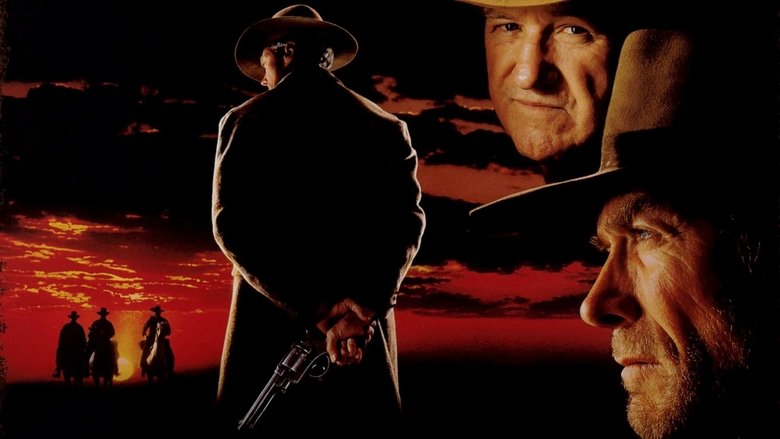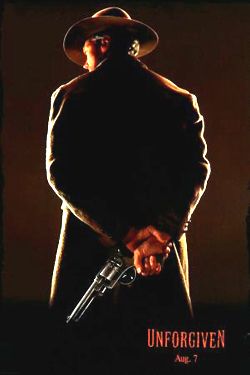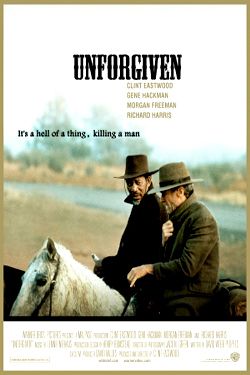← Back to Reviews

in

Oscar Wins: Best Picture / Best Director - Clint Eastwood / Best Supporting Actor - Gene Hackman / Best Film Editing
Oscar Nominations: Best Actor - Clint Eastwood / Best Art Direction / Best Cinematography / Best Writing / Best Original Screenplay
Though a line from the 2002 film Road to Perdition it could so easily apply here. If you're looking for a hero, you've come to the wrong place. Pretty much every character here is guilty, whether it be due to deeds in the present or in their past. The killers are vicious, and the sheriff is even worse! It's certainly not your daddy's western of 'cool' lone wolf anti-heroes, valiant sheriffs and stylistic, righteous killings. There is no romanticizing or mythologising of the Old West to be found here. As an example of how that kind of thinking came to be we have Saul Rubinek's writer who is travelling with English Bob, acting as his biographer. He is one of those men who have taken criminals and killers and turned them into somewhat mythic legends; people along the lines of Jesse James.
It really is quite a merciless deconstruction of the genre, and considering its source it's quite surprising. For someone who made his name with the genre it seems strange that Clint would want to be the one to expose its faults. Perhaps he had a sense of guilt about the previous depictions he had been involved with in terms of the films he made and the characters he portrayed. Here he tosses aside any pretensions of glitz and glamour, showing the western conventions for the illusions that they are. He shows that there is nothing noble or heroic to be found in this world.
The basic premise itself is not exactly groundbreaking. After all, the idea of someone coming out of retirement, taking on 'one last job' is one of the more clichéd tales in Hollywood circles; but that's not why this film is so highly regarded and loved. A lot of it is down to the characters that inhabit this world. Instead of the thinly sketched stereotypes that inhabit many a film, particularly the western, these are characters of depth who have real arcs; we see their progression, or should that be regression. The script is also full of some great dialogue, much of which helps to create great conversations and relationships between the characters.
The performances are excellent across the board, though a large degree of that I felt was down to the film's spot-on casting. For much of the film the characters and performances are the kind that these men have played many times before; it's just that here they excel themselves and ace their craft. Eastwood is terrific as Munny; a tremendously grizzled, pained performance. He convinces fully as this former criminal who is now worn down both physically and emotionally. Struggling to keep the promises he made to his late wife he is a man finding it impossible to escape from his past, whether it be down to the hero worship The Kid thrusts upon him or from the images that haunt his own mind. The most powerful and imposing performance I'd have to say however comes from Gene Hackman. As Big Whiskey's sheriff Little Bill, Hackman seems to take it on with relish, strutting around with a snarl and a sociopathic disposition. I found his character to be really quite terrifying, more so than any of the outlaws he fights against. While for the most part they are open and honest about who they are and what they do, Little Bill works under the impression that he is doing righteous, honourable work. And there's not much scarier a prospect than a man who can commit evil deeds but believe that they are in the right.
As 'The Kid' Jaimz Woolvett is incredibly annoying, but as that's what he is meant to be he has absolutely nailed it. His brash arrogance and lies just make you wish Munny and Ned would slap him around a little. But then after he accomplishes what he set out to do we see his true colours revealed. The guilt of what he has done has an immediate effect and Woolvett's acting here is extremely affecting. And as for Morgan Freeman, well he's Morgan f**king Freeman!!! You pretty much know what you're always getting with Freeman; it's very rare that I've ever seen a performance of his that left me unimpressed. Indeed the whole cast, no matter the size of the role, deliver the goods. Richard Harris is great as the snide, slimy English Bob; as Strawberry Alice Frances Fisher gives a tough as nails, vengeful showing and as the scarred Delilah, Anna Thomson is beautifully sensitive and sympathetic.
From the film's opening shot of Munny burying his wife against the backdrop of a beautiful sunset the film is frequently beautiful to look at as Eastwood and cinematographer Jack Green capture the landscape's immense vistas in beautiful snapshots. Alongside this however is how well realised the film's locations are; from Munny's house to the town of Big Whiskey they overflow with a weathered character, appearing as if they have stood for hundreds of years. And this is further fleshed out by the script which doesn't just focus solely on Eastwood's Munny, but creates a whole community of characters to interest and entertain us. My exposure to the western is still fairly limited so I may be mistaken but it seemed like the constant fall of rain was a bit of a break from the norm. Reminding me of my recent viewing of Rashomon it's more something I'd associate with the film noir genre in helping to create such a bleak, foreboding tone for the action.
There is not actually as much action as you may expect; well at least there wasn't as much action as I was expecting. For the most part it's a much quieter, meditative film only interrupted by the occasional violent and visceral burst, such as Little Bill's brutal beatdown of English Bob. And then there is the shootout at the film's conclusion. While it would usually be a source of great thrills, the way the scene is shot and its context within the story means it's actually quite a grubby affair. We feel a great sense of disappointment and sadness at watching Munny resort to his old ways, at allowing the monster within to break back to the surface. And I absolutely loved the aftermath of the shootout. Riding out onto the streets Munny warns that anyone who shoots at him shall feel his wrath. Despite numerous men having the opportunity, no one does. They are in so much fear at his presence. It's as if Munny has reached a somewhat mythic level, like an invincible demon that no one dares shoot at for they know they cannot hurt this man.
The western is a genre that I'm still struggling to find a genuine affinity for. There have been a couple I've loved (Dances With Wolves, Little Big Man) and a couple I've liked (the original 3:10 to Yuma, The Man Who Shot Liberty Valance) but for the most part it's not really worked for me, including those regarded as classics of the genre such as The Searchers. This would definitely join Dances With Wolves and Little Big Man as one of my favourites.
Conclusion – It's story may not be particularly original but the acting, directing and writing within its confines produce a classic, and truly enthralling western.

|

|
Year of release
1992
1992
Directed by
Clint Eastwood
Clint Eastwood
Written by
David Webb Peoples
David Webb Peoples
Starring
Clint Eastwood
Gene Hackman
Morgan Freeman
Jaimz Woolvett
Richard Harris
Clint Eastwood
Gene Hackman
Morgan Freeman
Jaimz Woolvett
Richard Harris
Unforgiven

Oscar Wins: Best Picture / Best Director - Clint Eastwood / Best Supporting Actor - Gene Hackman / Best Film Editing
Oscar Nominations: Best Actor - Clint Eastwood / Best Art Direction / Best Cinematography / Best Writing / Best Original Screenplay
Plot – At a whorehouse in the town of Big Whiskey two cowboys cut up one of the girls. When they are unsatisfied with the 'punishment' that the sheriff, Little Bill, dishes out to the cowboys the girls take things into their own hands, placing a bounty on the heads of the cowboys responsible. The bounty grabs the attention of a youngster who goes by the name of The Schofield Kid (Woolvett). Looking for a partner he visits retired gunman and killer William Munny (Eastwood) with the offer of joining him. Despite promising his late wife he would never return to that life Munny is struggling financially and feels he has no need but to take on the task, bringing his old partner Ned (Freeman) into the fold. They may be out to grab the bounty, but there is one man out to make sure that no-one does – Big Whiskey's sheriff Little Bill (Hackman).
“And there is only one guarantee; none of us will see heaven”
Though a line from the 2002 film Road to Perdition it could so easily apply here. If you're looking for a hero, you've come to the wrong place. Pretty much every character here is guilty, whether it be due to deeds in the present or in their past. The killers are vicious, and the sheriff is even worse! It's certainly not your daddy's western of 'cool' lone wolf anti-heroes, valiant sheriffs and stylistic, righteous killings. There is no romanticizing or mythologising of the Old West to be found here. As an example of how that kind of thinking came to be we have Saul Rubinek's writer who is travelling with English Bob, acting as his biographer. He is one of those men who have taken criminals and killers and turned them into somewhat mythic legends; people along the lines of Jesse James.
It really is quite a merciless deconstruction of the genre, and considering its source it's quite surprising. For someone who made his name with the genre it seems strange that Clint would want to be the one to expose its faults. Perhaps he had a sense of guilt about the previous depictions he had been involved with in terms of the films he made and the characters he portrayed. Here he tosses aside any pretensions of glitz and glamour, showing the western conventions for the illusions that they are. He shows that there is nothing noble or heroic to be found in this world.
Film trivia - While it may have been nominated for an Oscar, David Webb People's script was far from a hot property in Hollywood. It floated around for nearly 20 years, during which Gene Hackman read and rejected it, before Eastwood scooped it up. Even then it took Clint several years to actually bother reading it after his script reader had informed him that it wasn't very good.
The performances are excellent across the board, though a large degree of that I felt was down to the film's spot-on casting. For much of the film the characters and performances are the kind that these men have played many times before; it's just that here they excel themselves and ace their craft. Eastwood is terrific as Munny; a tremendously grizzled, pained performance. He convinces fully as this former criminal who is now worn down both physically and emotionally. Struggling to keep the promises he made to his late wife he is a man finding it impossible to escape from his past, whether it be down to the hero worship The Kid thrusts upon him or from the images that haunt his own mind. The most powerful and imposing performance I'd have to say however comes from Gene Hackman. As Big Whiskey's sheriff Little Bill, Hackman seems to take it on with relish, strutting around with a snarl and a sociopathic disposition. I found his character to be really quite terrifying, more so than any of the outlaws he fights against. While for the most part they are open and honest about who they are and what they do, Little Bill works under the impression that he is doing righteous, honourable work. And there's not much scarier a prospect than a man who can commit evil deeds but believe that they are in the right.
As 'The Kid' Jaimz Woolvett is incredibly annoying, but as that's what he is meant to be he has absolutely nailed it. His brash arrogance and lies just make you wish Munny and Ned would slap him around a little. But then after he accomplishes what he set out to do we see his true colours revealed. The guilt of what he has done has an immediate effect and Woolvett's acting here is extremely affecting. And as for Morgan Freeman, well he's Morgan f**king Freeman!!! You pretty much know what you're always getting with Freeman; it's very rare that I've ever seen a performance of his that left me unimpressed. Indeed the whole cast, no matter the size of the role, deliver the goods. Richard Harris is great as the snide, slimy English Bob; as Strawberry Alice Frances Fisher gives a tough as nails, vengeful showing and as the scarred Delilah, Anna Thomson is beautifully sensitive and sympathetic.
Film trivia – Just because you're a family member don't expect any special treatment from Clint! His own mother had to toil through an uncomfortable day as an extra while wearing a very heavy dress. And the scene didn't even make it into the film! With Clint left to apologise for having to cut it. He did however make it up to her when he took her to the Academy Awards and then gave her substantial thanks in his acceptance speech.
There is not actually as much action as you may expect; well at least there wasn't as much action as I was expecting. For the most part it's a much quieter, meditative film only interrupted by the occasional violent and visceral burst, such as Little Bill's brutal beatdown of English Bob. And then there is the shootout at the film's conclusion. While it would usually be a source of great thrills, the way the scene is shot and its context within the story means it's actually quite a grubby affair. We feel a great sense of disappointment and sadness at watching Munny resort to his old ways, at allowing the monster within to break back to the surface. And I absolutely loved the aftermath of the shootout. Riding out onto the streets Munny warns that anyone who shoots at him shall feel his wrath. Despite numerous men having the opportunity, no one does. They are in so much fear at his presence. It's as if Munny has reached a somewhat mythic level, like an invincible demon that no one dares shoot at for they know they cannot hurt this man.
Film trivia – Unforgiven was just the third western film to ever win the Academy Award, following Dances With Wolves and Cimarron.
Conclusion – It's story may not be particularly original but the acting, directing and writing within its confines produce a classic, and truly enthralling western.
